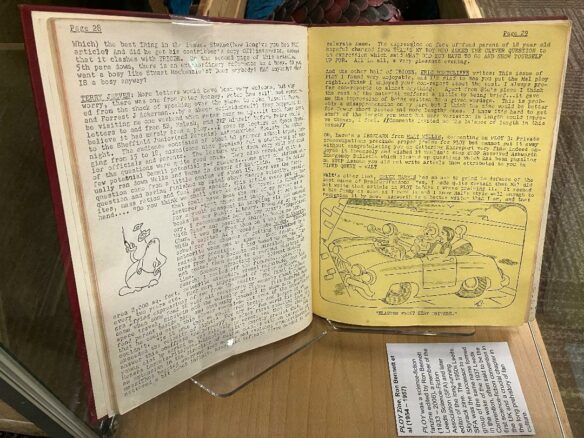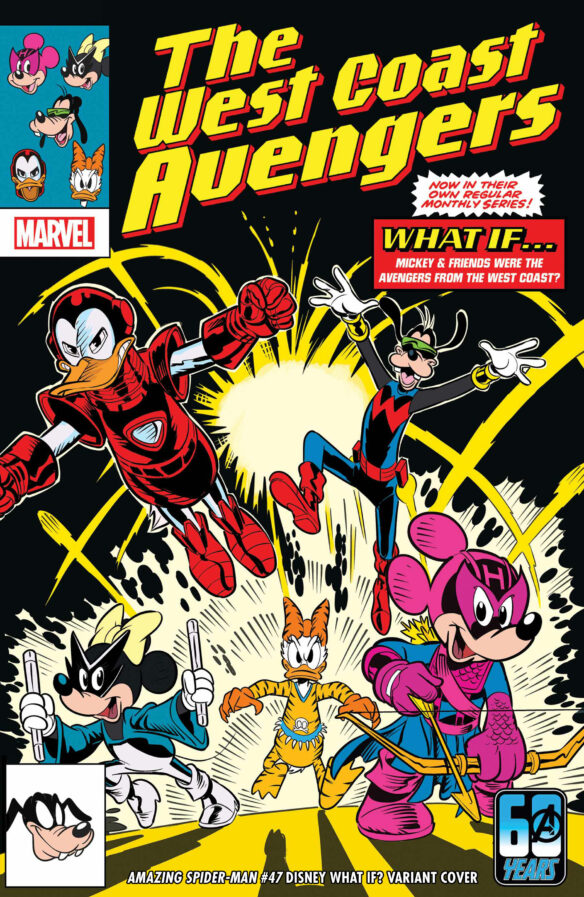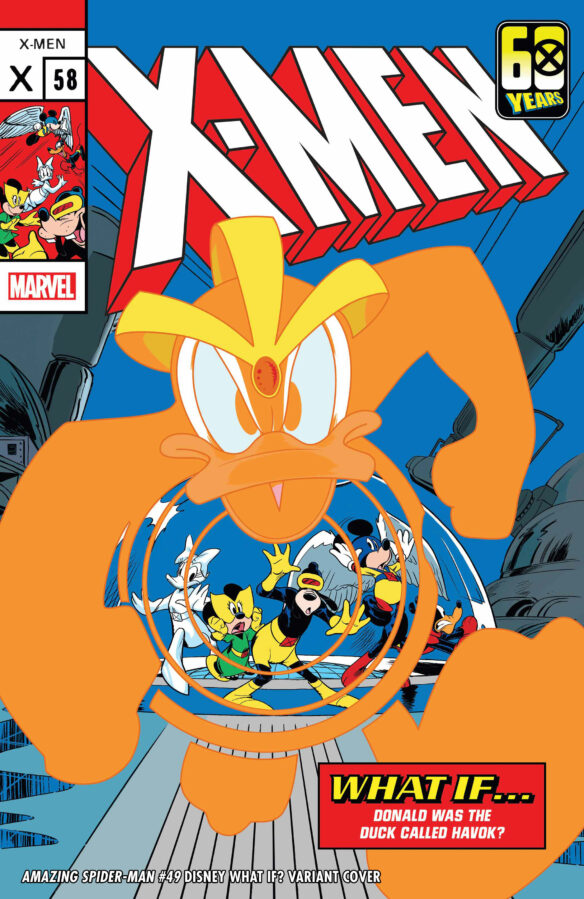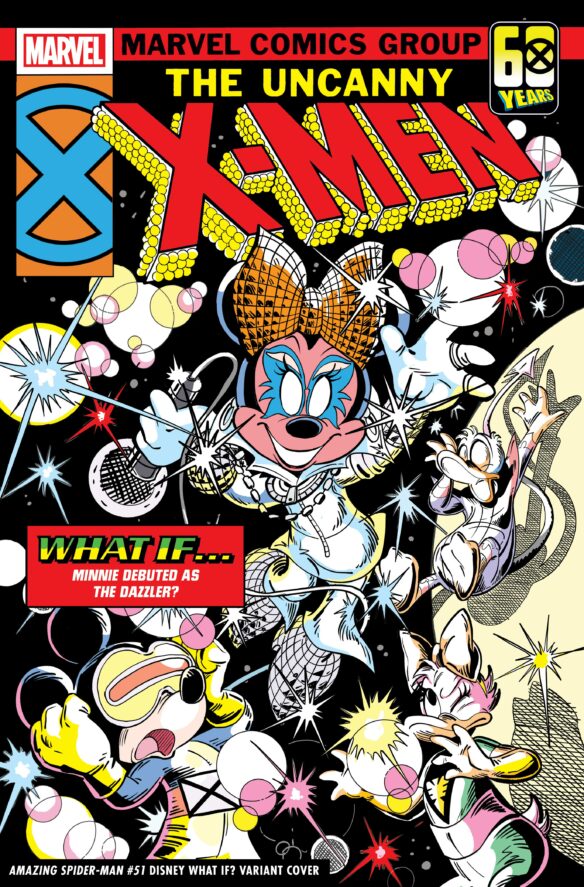(1) HELP NEEDED. Writer Richard Kadrey, whose work includes the Sandman Slim novels, is asking for financial help in a GoFundMe for “Medical bills, rent, and a big, hungry cat”.
This is one of the hardest things I’ve ever had to do, but my back is against the wall. Because of physical and mental health issues over the last year, plus disappearing gigs and jobs that never came through, I have to suck up my pride and ask for help.
I’ve been living off savings and credit cards for a year. I had one good, steady gig but got blindsided when it ended abruptly. Now that money is gone, my cards are pretty much played out, and the IRS is giving me the side eye. And there are still health issues and bills I need to deal with. Basically, I could use some help to feed my cat and keep my stupid life intact.
If you could spare a couple of bucks, you’d a life saver. And if one of the good gigs I’m hoping for comes through later this year, I promise to pay your kindness forward to another artist down on their luck.
So, here I am with my dumb hat in my dumb hand, humbled as hell. This is the last thing in the world I ever wanted to do. But I don’t have a choice. Even if you can’t help, thanks for reading this. I appreciate it and so does Aces, my hungry cat who will eat me if I don’t keep up with the kibble.
(2) MORE QUOTES ABOUT HUGO CONTROVERSY FROM CHINA SOCIAL MEDIA. On Bluesky, Angie Wang has some screencaps and computer translations to go with this introduction:
RE the Hugo Awards, if you go on Weibo and do a public search right now, you’ll see some Chinese fans cussing the hell out of the Chengdu organizers specifically, and some cryptic remarks from someone who seems related to the event and the organizers about trying to prevent all this from happening
(3) PAIJIBA. Pajiba’s Nate Parker brings schadenfreude to bear on the topic in “The Hugo Awards Step In It Again”.
… If you look through McCarty’s thread – and you should, because it’s fun to watch him get wrecked in real time – you’ll see Gaiman’s about the only one who gets a polite answer. “After reviewing the Constitution and the rules we must follow, the administration team determined those works/persons were not eligible.”
He repeats the same answer ad nauseum despite multiple polite requests for clarity. It’s a vague answer for an organization that prides itself on inclusivity and transparency….
(4) POLYGON. Chris Barkley is quoted in Polygon’s coverage, which otherwise contains nothing new to readers here: “Hugo Awards controversy sparks censorship allegations”.
… The Hugos are among the most prestigious awards in science fiction and fantasy, and it’s incredibly disheartening to see what should be a celebration of all the great work happening in that space be tainted by controversy. With the committee still refusing to give answers and with no central governing body to step in, it seems unlikely we’ll ever know the details of what occurred — or see anyone held accountable if anything unconstitutional did.
What is clear is that the community is determined never to see a repeat of what occurred this year. As Barkley wrote, “this incident, whether it was at the behest of the government of the People’s Republic [of] China or some other entity, will NEVER be forgotten and that doing something about preventing such a thing from happening again will be at the top of the agenda at the Glasgow Worldcon Business Meeting in August…”
(5) WHERE IN THE WORLD. At Winter Is Coming, Daniel Roman’s article “Controversy strikes the 2023 Hugo Awards, causing uproar over censorship speculation” ends with this conclusion.
…I happened to be at DisCon III when Chengdu won the bid for this year’s Hugo ceremony, and one of the prominent arguments in its favor that I heard floated around was that Worldcon should be a world convention, not just one that floats back and forth across the U.S. and a handful of other western countries. Bringing it to countries in, for example, East Asia and Africa would be a great way to include fans in parts of the world who have not typically been able to attend, and to recognize the writers doing amazing work in those regions.
However, if each Worldcon must logically abide by the local and regional laws of the country where it’s being held, and those laws mean that the Hugo Awards cannot be conducted legitimately and fairly because of things like censorship — or even worse, that certain groups of people might have their safety put in jeopardy — then that must be considered as well. We have a situation right now where it’s being speculated that there was government censorship on the 2023 Hugos, and regardless of whether there was or not, it seems clear that the people behind the event do not feel that everyone involved is safe enough to explain the situation in full. In that sort of circumstance, it’s hard to imagine any scenario where the awards can actually take place in a legitimate manner.
(6) OKAY, HERE IT IS. You want the truth? You think you deserve the truth? Sarah A. Hoyt will give it to you: “This Thing Isn’t Entirely Under My Control” at Mad Genius Club.
…Among the many strange things I get asked — and other writers get asked — is how we do what we do. I.e. how we create the stories, and stay on track and write them and all.
Now, normally when I’m asked this I’m at a panel, where I’m under writ to tell a lot of lies, provided I make them entertaining. Also, on principle, I’m supposed to sound like a professional who know what she’s doing. Of course, acting like a pro should be easy after 30 years or so of being published (okay, 25 years just about in novels. But yeah, about 30 from first semi-pro short story.) And if you believe that, I have some primo Florida swamp I’d like to sell you at a really good price.
I often wonder, though, if my fellow writers lie like moth eaten rugs at this panels. Because they make the whole thing sound so rational, so controlled. “Well, I wanted to write a book about the manufacture of bells in the planet Korud, so, I thought, how do I wrap an adventure around that?” And we all smile and nod sagely as someone explains how he researched the manufacture of bells for five months, then went to a Buddhist monastery and sat contemplating the metalness of bells, before the idea of having pirates come to the planet and remove the bells, and then our hero….”
I know I lie. I lie a lot about the writing process, when I want to sound like I did things for a reason. Well, and when I worked for Trad Pub. Because you don’t want your editor and publisher to think you’re a complete loon. But more and more I just tell the truth.
And the truth is “this thing isn’t fully under my control.”…
(7) BIG CUTS AT LA TIMES. From Politico: “LA Times slashes newsroom as paper struggles under billionaire owner”.
The Los Angeles Times on Tuesday laid off at least 115 people, including about a quarter of its newsroom, in a stunning second round of major layoffs in less than a year that underscored broader challenges facing the news business.
Cuts included reporters, editors and columnists, according to the union that represents the newsroom and social media posts from individual journalists. Layoffs fell disproportionately on Black, Latino and Asian employees who tend to have less seniority, the Guild said in a statement….
(8) CHASING MOBY CHATGPT. In a recent email to members from the Authors’ Licensing and Collecting Society the ALCS’ Deputy Chief Executive Richard Combes expects the coming year to provide more clarity around AI, authorship and copyright.
My piece last year opened and closed with a few sentences generated by ChatGPT. At the time, this seemed like a novel way of demonstrating the capability of the technology; then I found the acres of other articles doing the exact same thing. But as Herman Melville observed, “it is better to fail in originality than succeed in imitation.”
During the intervening year, the think pieces have piled up, commenting on various policy initiatives, lawsuits and existential crises, while AI-generated content has sprouted online like fungi on the forest floor (including, notoriously, several foraging guides offering unreliable advice about edible mushrooms).
As judicial decisions and statutory rules emerge and evolve over the coming year, we should begin to find answers to key questions about copyright, authorship and creativity in the age of AI. Conceptually, we’ve been here before, repeatedly. The first quarter of this century has seen successive technologies redefine the way that creators’ works are consumed and distributed without due consideration for how they will be credited and paid, and the latest wave is no different.
The false dilemma that’s often presented between an innovative tech sector and a robust framework for copyright and creators’ rights is as artificial as it is banal. It is possible and, if we want to maintain the value and stature of our creative industries, essential to develop models whereby the tech sector is an ally to those creating the works upon which their products and services rely. So, how do we get there from here?
…For almost 20 years, the ALCS authors’ earnings surveys have described a fixed direction of travel, a stubbornly downward trend. This threatens not only the viability of existing careers but also creates barriers to entry for new and diverse voices. So, our work this year is about plotting a new course, on what promises to be an interesting, challenging but vitally important journey; which leads me to close as I opened, with Melville, “it is not down in any map; true places never are”.
(9) LOVIN’ SPOONFUL. Charlie Jane Anders argues on behalf of “10 Space TV Shows That Don’t Get Enough Love” at Happy Dancing.
The first two on the list are:
1) Space Cases.
Peter David and Bill Mumy created this YA TV show about kids exploring space, including a young Jewel Staite. It aired for two seasons on Nickelodeon, and it was cute as hell, not to mention quite subversive at times. George Takei plays an alien conqueror named Warlord Shank, and when I say Takei chews all the scenery… You’ll see tooth marks all over the sets. This show was sort of a precursor of Star Trek: Prodigy, and I remember it being fun as all heck.
2) Quark.
Quark was a short-lived spoof of Star Trek and Star Wars that aired in 1977, featuring a host of campy characters. The thing is, it had so many cool ideas in the mix. Long before Firefly (or even Alien), this is the story of the crew of a humble blue-collar starship — a garbage scow, in this case – getting involved in vital, dangerous shenanigans. There’s a gender-fluid character, a pair of clones who both insist they’re the original (just like the Maulers in Invincible!) and a plant in humanoid form. In many ways, Quark was ahead of its time.
(10) AFTER ACTION REPORT. [Item by Steven French.] The recently wrapped-up “Fantasy: Realms of Imagination” exhibition included several science-fiction related items, including this copy of the March 1956 issue of Ploy, a fanzine edited by Ron Bennett, a member of the Leeds Science Fiction Association which, as the exhibit’s label notes, was the successor to the group formed after the famous 1937 convention (not just the first in the U.K. but the first in the world!). For some reason the Library chose to display these letters from fellow fans, one of which including a description of a talk given to the Sheffield Junior (and Parents) Astronomical Society which contains language ‘of its time’ that would definitely be deemed inappropriate nowadays.
Elsewhere in the issue (available here at the FANAC site) there are brief contributions from mega fans/editors/authors Shirley (Lee) Hoffmann and Terry Carr.

(11) FRANK STROM DIES. Comics fan and writer Frank Strom recently died, mourned by his friend Tom Brevoort in “Mortality” at Man With A Hat.
…Frank had aspirations of breaking into the field professionally, and he operated on the fringes of it for many years, but was never quite able to find that break that would make it a full time vocation. He wrote a ton of issues of the licensed ELVIRA comic book, he had a short-lived series in Fantagraphics’ X-Rated Eros line in the 1990s, CHEETA POP, SCREAM QUEEN, and he wrote one story for Marvel. That one I commissioned from him especially; it starred the 1940s/1950s character Venus who was a fascination of both of ours, and guest-starred both a number of the girl comics stars of the 1950s but also a small bevy of Marvel’s pre-hero monsters. I was able to convince Dan DeCarlo, Frank’s favorite, to draw it. Eventually, though, he settled into a routine day job….
(12) TODAY’S BIRTHDAY.
[Written by Cat Eldridge.]
Born January 24, 1944 — David Gerrold, 80. How could I not start by acknowledging he wrote one of the best scripts ever in the Trek series, “The Trouble with Tribbles”? Seriously it’s a perfect script from the very beginning to those Scottie saying “Aye, sir. Before they went into warp, I transported the whole kit ‘n’ caboodle into their engine room, where they’ll be no tribble at all.” It garnered a Hugo nomination at Baycon.

Not that he stopped there of course. He was responsible for an uncredited rewrite on “I, Mudd”, and he scripted along with Oliver Crawford the rather excellent “The Cloud Minders” in season three.
The animated series which I still truly adore and which of course is on Paramount + saw him following up his “The Trouble with Tribbles” script with one for “More Tribbles, More Troubles”. His other animated script was “Bem” in which he reveals James T. Kirk’s middle name to be Tiberius. I had thought it’d been done in the series but that’s just my memory. It’ll next be used in The Undiscovered Country.

He left Star Trek: The Next Generation and the Trek verse as Memory Alpha explains here: “He left the show near the end of the first season, partly because of the dispute over his controversial script, ‘Blood and Fire’. The story, which was basically an allegory of AIDS, and involved allegedly homosexual characters, was initially scrapped by the producers. It was re-written by Herb Wright as ‘Blood and Ice’, removing the gay characters, but it still remained unproduced.” Well and other reasons that he into in great detail as well.
Not at all surprisingly, he got involved in those video fan fictions, as a series consultant for fan-produced series Star Trek: New Voyages, and Star Trek: Phase II for which he was named show runner. He fell out later with other members of the latter series over creative differences and left.
Let’s see… let’s not overlook that JMS actually did produce his “Believers” script on Babylon 5, a story involving our good doctor, aliens and a very unfortunate outcome.
Books? Oh yes. When HARLIE Was One is an extraordinary novel. Though I’ve sampled his other novels, it’s his most original, most interesting and certainly most intriguing work. Interestingly, at least to me, I discovered doing this essay that When HARLIE Was One is not a one-off but is rather just one novel in a rather extensive series entitled simply Harlie. Intriguingly the first one is titled Oracle for a White Rabbit. Was that Rabbit there?
The War Against the Chtorr series of books, about an invasion of Earth by deliberately not sketched out aliens was, errr, ok. I read A Matter for Men and A Day for Damnation but stopped there. There were two more published then a comedy or tragedy of reasons for why the series wasn’t completed have followed in the decades since.
Other novels? Well there’s this novelette called “The Martian Child” won a Hugo at Intersection which became a film. There’s the most readable The Man Who Folded Himself that nominated for a Hugo at Discon II. It’s wonderful and certainly deserved that Hugo.
Now my favorite work by him is the first novel that he did, The Flying Sorcerers which started out in If as “The Misspelled Magician” which I like better as a title. It was co-written with Larry Niven.
There’s too much other fiction, both long form and short form which I’ve not encountered to deal with here. I know all of you well enough that you’ll note anything that you think I should mentioned.
(13) WEIGHING MJOLNIR. After viewing Neil deGrasse Tyson’s analysis of “How Much Thor’s Hammer Weighs”, Daniel Dern notes (anticipating much of Tom Galloway’s initial comment-worthy thoughts) (playlist: “She’s So Heavy,” The Beatles) —
Overspecialized nerds missing the point: Neil deGrasse Tyson forgets (or never read the relevant Marvel comics, nor watched the right Marvel movies). Unlike Superman’s super-heavy regular-sized front door key to his Fortress of Solitude (see Grant Morrison & Frank Quiteley’s All-Star Superman) (as opposed to the original classic humongous key pretending to be a road sign for plane flight paths), Mjolnir’s liftability was a function of the lifter’s worthiness.
(14) MICKEY AND FRIENDS PLAY AVENGERS AND X-MEN IN NEW DISNEY WHAT IF? COVERS. This time marking the 60th anniversary of two of Marvel’s most iconic super hero teams—the Avengers and the X-Men — new Disney What If? variant covers kicked off earlier this month with Amazing Spider-Man #41 and will continue to adorn select issues of Amazing Spider-Man throughout 2024.



(15) DISNEY IMAGINEER JOINS INVENTORS HALL OF FAME. “Lanny Smoot Becomes The Second Person From Disney, Since Walt Disney Himself, To Get Inducted Into The National Inventors Hall Of Fame” reports Yahoo!
… The Disney Parks Blog reports that The National Inventors Hall of Fame announced its Class of 2024 inductees during a ceremony at the Walt Disney Imagineering campus in Glendale, CA.
Smoot is making history as the first Disney Imagineer to receive this honor. He’s also only the second Walt Disney Company employee since Walt Disney to earn the recognition.
During Smoot’s 45-year career, he has been a theatrical technology creator, inventor, electrical engineer, scientist, and researcher. The innovator has amassed a collection of over 100 patents, 74 of them created during his 25-year stint at the Walt Disney Company….
… Smoot has been integral in creating some of the most technically advanced special effects at Disney theme parks and experiences. Some examples of these special effects include Madame Leota’s floating in the Séance Room at Disneyland’s Haunted Mansion, Disney Live Entertainment’s extendable lightsaber, the Magic Playfloor interactive game experience on the Disney Cruise Line, and the Fortress Explorations adventure at Tokyo DisneySea….
(16) EVERYBODY KNOWS LOTR. [Item by Daniel Dern.] “The Trick to the Fluffiest Muffins May Already Be in Your Kitchen” says the New York Times.
As winter set in this January, Sarah Kieffer recalled how it snowed for eight months last year in her hometown, Minneapolis. For weeks on end, the temperature dipped below minus 20. Surrounded by grayness, she baked blueberry muffins for the cheer of their bright pops of blue.
“It’s like when the hobbits got to Mordor, and Sam looks up and sees a bright shining star, and has a little bit of hope,” she said. “That’s what a blueberry muffin feels like in February.”
Ms. Kieffer, the author of “100 Morning Treats” (and a self-described “super nerd”)…
Daniel Dern comments: Implicit in the text is the assumption (by the writer and NYT section editor) that the reader is at least familiar to recognize the source (Lord of the Rings) without the invocation of Frodo, Gandalf, Bilbo or Gollum — and simply saying “Sam” rather than “Samwise” or “Sam (Frodo’s more-than-a-sidekick)” although “hobbits” and Mordor” do help provide key context, of course.
At least Ms. Keiffer didn’t close with an ending like “I’ll bet even Gollum might exclaim ‘Better than Precious!’”
(17) MEET JOE GREEN. The FANAC FanHistory Zoom Joseph L. Green Interview is now available to watch on YouTube.
Title: Joseph L. Green – An Interview conducted by Edie Stern
YouTube Description: Joe Green’s interest in science fiction began in the 1940s, before he knew there was even a name for this kind of literature. His introduction to science fiction fandom came in the early 1950s, and first published fiction in the 1960s. Add to that his long career in the military and civilian space programs, and you have a trajectory that is the envy of a many a science fiction reader.
In this fascinating interview, Joe Green talks about his life and career, and his views on science fiction and fandom after more than 70 years in the SF community. With a professional career spanning more than 60 years, (his last published work was in 2023), in this discussion Joe starts with his introduction to fandom, and his early fanzine contributions, his first professional sales and the struggle to balance fandom, professional writing and a growing family.
With a decades long career revolving around space, he tells anecdotes ranging from the Cuban missile crisis of the 60s to one of his most important accomplishments – editor and principal writer of the NASA report on the Challenger disaster. Here he talks about that difficult but necessary work….Starting in the days of the manned Apollo launches, the Greens hosted spectacular and now legendary launch parties. Joe couldn’t help but share his joy at one of the finest achievements of mankind. In this session, there are great anecdotes about well-known writers and fans, including Poul Anderson, Sam Moskowitz, Arthur C. Clarke and A.E. Van Vogt, and Joe’s unorthodox advice about getting entrée to NASA launches. It’s a delight to hear, and makes you wish you had been there.
One story we didn’t get to was what happened when Joe Green heard filk music for the first time. Joe was delighted, especially with the space-oriented pieces, and not too long after he heard the “Minus Ten and Counting” recording, one of those songs was played as the wake-up music for the astronauts in space.
Many thanks to Joe’s daughter, Rose-Marie Lillian for her technical support, enabling Joe to participate in the Zoom.
(18) TURNING TWENTY ON MARS. From an National Air and Space Museum email:
20 years ago this month, Mars Exploration Rovers Spirit and Opportunity landed on the Martian surface, on opposite sides of the Red Planet. Soon after, the twin rovers, boasting a level of mobility that far surpassed the 1997 Mars Pathfinder rover Sojourner, embarked on their respective journeys. Spirit was sent to the floor of a 90-mile-wide crater named Gusev and Opportunity was sent to Meridiani Planum, a smooth area near the Martian equator.

With identical sets of science instruments onboard, Spirit and Opportunity conducted comprehensive geological surveys and atmospheric analyses. Both rovers were able to find compelling evidence of the Red Planet’s ancient environments, revealing a past where conditions were intermittently wet and potentially capable of supporting life.

Both rovers exceeded their initial 90-day mission durations by a significant margin. Spirit traveled five miles on the Martian surface and sent its last message to Earth on March 22, 2010, after operating for over six years. Opportunity covered a total of 28 miles and holds the record as the longest-serving rover on Mars, having conducted over 14 years of exploration before it sent its last signal on June 10, 2018. Together the duo sent over 340,000 images back to Earth.

The twin rovers’ landings on Mars also marks 20 years of continuous rover exploration of the Red Planet, with rovers Curiosity and Perseverance currently active on Mars and continuing on the legacy of Spirit and Opportunity.
(19) VIDEO OF THE DAY. I haven’t viewed it because my hearing is awful and there’s no closed captioning, but no reason you should deprive yourself: “The Litigation Disaster Tourism Hour: World Contastrophe, Trademark Edition” on Twitch.TV.
[Thanks to Andrew Porter, John King Tarpinian, Chris Barkley, Daniel Dern, Danny Sichel, Francis Hamit, Trey Palmer, Cat Eldridge, SF Concatenation’s Jonathan Cowie, Steven French, and Mike Kennedy for some of these stories. Title credit belongs to File 770 contributing editor of the day Andrew (not Werdna).]
Discover more from File 770
Subscribe to get the latest posts sent to your email.

(13) As far as I can tell, NdT lives in constant fear someone some where might derive pleasure from reading or watching fiction.
(12) – No, “The Trouble with Tribbles” did not win a Hugo. It was one of several Trek episodes nominated that year, but “The City at the Edge of Forever” was the one that actually won.
Actually, Chtorr was way more than OK. And The Man Who Folded Himself is remarkable. Happy birthday!
I forgot to ask Joseph L. Green what happened to his website, but I am afraid it would be no good news.
Actually, Chtorr was way more than OK. And The Man Who Folded Himself is remarkable. Happy Birthday!
I forgot to ask Joseph L. Green what happened to his website, but I am afraid it would be no good news. And belated Happy Birthday too.
I feel particularly welcomed by today’s typo, sorry, title
(14) It’s bothering me more than it should that for two of those covers Minnie and Mickey are not matched as Scott and Jean. You’ve got Goofy and Minnie on one and Mickey and Daisy Duck on the other
Quark was a hoot and a half. I enjoyed the show when it aired and got the DVD when it came out. Richard Benjamin was just right as the put-upon captain of the ship, constantly having to answer to Conrad Janis (the Assistant to the Head) as well as the Head who was seen as a giant conehead like head floating in space. (“You can’t talk to the Head right now, he’s got an enormous headache…”)
9) Space Cases was a fun show.
Jan Vanek jr. says I forgot to ask Joseph L. Green what happened to his website, but I am afraid it would be no good news. And belated Happy Birthday too.
Checking Internet Archive, that site went down some five years ago. He moved it to a new host and was obviously going to update but didn’t.
Checking Internic, a place you check for who owns a site, confirms he stills owns it.
Ah, thanks.
(9) Loved Quark!
Thanks for the Title Credit (I nearly made it Tyops, Cam)
“It’s beyond my control” is a recurring line in the movie VALMONT (the lesser Dangerous Liaisons movie, the one fewer people remember)
These are the Pixels we must File…
(Has ANYONE heard from Ben Yallow yet?)
(1) It really sucks that so many creative people have to crowdfund their medical emergencies. 😐
(7) Ugh. Another billionaire cutting important staff to make more money.
(9) Yay! I’m not the only one who liked “Quark”! 🙂
1) Ah man, that’s rough. I really enjoyed the Sandman Slim series, although I did kinda lose track of it at about the third or fourth one.
3) Oh man, that takes me back. I used to comment on Pajiba pretty regularly years ago and then around 2015-16 or so there was a sea change in both the commenters and the writing staff. It got super weird, kinda mean, and stopped being fun so I stopped participating.
4) Given that Sad Puppies is still living rent-free in a non-zero number of heads ten years later, I can 100% believe that the current excitement won’t ever be forgotten. That anyone will learn anything or that anything productive or effective will actually come out of all the sturm und drang anytime soon I’m somewhat more skeptical of.
1) Go Fund Me is NOT a good healthcare plan! Vote this November as though your life depended on it!
6) Where does creativity come from? That’s the realm of science.
However, i can attest, absolutely, that in my case, it grows organically, from a thought, a dream, an encounter with the unusual, or from divine intervention. You either get it and run with it, or you don’t.
Logical thinkers can come up with plots and scenarios (that are then copied again and again), but creative thinkers just “magic it” up. You can’t create the ideal writer out of alphabet soup (AI), as it doesn’t know what it is to be human (or not), and it can only generate things that relate to existing works.
Anyone with an IQ of 120 or above can be a creative genius, but again, it depends on what they do with it. Walt Disney had an IQ of 122, and a creativity quotient that was genius. Jim Henson had an IQ around 179 (genius) and also had a very high creative quotient. Those that have a high CQ but never do anything with it, you never hear of.
7). Patrick Soon-Shiong, the owner of the LA Times, has a Forbes estimated net worth of $5 billion. Charles Foster Kane said “You’re right, I did lose a million dollars last year. I expect to lose a million dollars this year. I expect to lose a million dollars next year. You know, Mr. Thatcher, at the rate of a million dollars a year, I’ll have to close this place in… sixty years.” Mgmt is claiming they are loosing $30-40 million a year. That means Soon-Shiong would run out of money in 125 YEARS. Sadly, we obviously need more people like Charles Foster Kane.
7) And soon to follow, the Baltimore Sun I’m afraid. Just got bought by Sinclair, and the new owner held an all hands meeting where he told staff he wanted the Sun to be more like Fox News. Anecdotally, subscribers are canceling like mad. (And then getting enough calls from customer service trying to get them to re-up that they’e having to block the calls).
12) My fave of his is the Dingilliad/Starsiders trilogy.
(2) I’m glad to see more amplification of the voices of Chinese fans in China to Western fans. We need to be hearing from them just as much as we’re hearing from each other. They’re clearly very angry and upset, just like we are, and they can provide some insights perhaps into what might have happened. The picture they’re painting is one of corporate interests hijacking the convention and the concom being only too happy to go along with it.
@Carl…Full Scale IQ is not necessarily relevant in this case, and I wish people who haven’t the faintest idea about it would stop throwing out those meaningless numbers when they talk about cognitive measures.
Yes. Meaningless. In my opinion, the FS IQ (and its equivalent from batteries other than the Weschler) is meaningless. I was a special education case worker (and teacher) for ten years. I spent a lot of time working with those particular numbers as part of my job (determining special ed eligibility) and I can tell you that the FS IQ isn’t useful. I was thrilled to death when my district stopped using the discrepancy model for learning disability (essentially, requiring a predetermined difference in points between the FS IQ and academic assessment scores) and went to a pattern of strengths and weaknesses model.
Using subtest measures allowed for more accurate identification of learning problems than the FS IQ–and, in my opinion, is the ONLY reason for using cognitive assessment.
The meaningful part of any cognitive assessment lies in the individual subtest scores. That’s where you can tell if someone has issues, which in the case of learning disabilities, usually shows up in the processing measurements–either processing speed, short term/long term/working memory, or auditory processing, amongst others. The single full scale score can hide a lot.
Oh, and paper and pencil testing alone is meaningless. That only measures verbal/acquired information, and is easily biased by culture and education. A valid and reliable cognitive assessment will involve paper and pencil pieces, but there are other pieces administered one-on-one. While I was not allowed to perform cognitive assessments (trained psychologists generally administer those batteries), I performed the academic assessments (the full batteries include cognitive AND academic assessments). In both cases, administrator notes about subject reactions and responses are an important piece of the assessment.
I had several cases where a student at the elementary grade level who was academically struggling still managed to make it to college-level math questions. Part of that is due to the requirements of an assessment, whether cognitive or academic, to establish a floor of six correct answers on the same page, and a ceiling of six wrong answers per page. How could a fifth grade student make it to that level of questioning in math reasoning? Questions with visual elements–and the student scored off-the-charts in visual-spatial processing.
Okay, now that I’ve bored everyone with my rant…IQ scores are problematic in this manner, and very few people are aware of this issue.
Hoffman, of course. Just “Lee,” as well, meaning “Lee Hoffman.” Nobody in fandom ever called her “Shirley.”
Jeez, from one of the most famous fans of the decade (of the 1950s) to “how do you spell your name”?
(9) Quark was a heck of a lot of fun.
(15) You left out the important bit: Is he any relation to Oliver R. Smoot?
(7) @Troyce: Patrick Soon-Shiong has a net worth of about five billion dollars; that doesn’t mean he has five billion dollars of money. As a rough approximation, a net worth of five billion dollars means controlling a productive enterprise (or from his wikipedia page, several enterprises) through which about two billion dollars flows every year, of which about 1.8 billion are needed to keep the enterprise running productively.
That leaves about two hundred million dollars a year, for everything else Soon-Shiong wants to do – running the Los Angeles Times, running the San Diego Tribune, other philanthropic ventures, growing his existing enterprises, starting new enterprises, making sure his extended family can live the good life in uncertain times, and paying taxes. And if he tries to take out any more than that, the market will notice that his core enterprises are underfunded and his net worth will not be five billion dollars any more.
If your strategy depends on some other person devoting a quarter of their real income to your cause without getting anything back but good feelings, that’s a pretty tall order and there’s a good chance that he’ll decide he has other causes more important than yours. You can yell at him for being a greedy miser, but really you need a better plan.
Thanks for the rec, Mike, and my apologies. There’s supposed to be some third-party extension I can add that will do captioning, and that task keeps slipping from my view. I’ll move it back up my priority stack.
ja: I had a friend who’s TV station was on the verge of being bought by Sinclair. They’re a horrible right-wing group that meddles with the news and slants it just like Fox Spews. If the Baltimore Sun has been bought by them, they are doomed as a legitimate news source.
John: I agree, I need a better plan, which is mainly taxing these billionaires enough so they aren’t billionaires. It usually takes a sociopath to get to that level of wealth, and they can’t be trusted to use their money for the benefit of society (you will be shocked, shocked I say, to learn I don’t adhere to the Chicago school of economics).
@Troyce: Are you then expecting the government to directly finance the newspapers? Because I can definitely see that going badly wrong, and I’m not sure I’ve ever seen it go right. Billionaires, for all their faults, do occasionally finance well-run newspapers.
@John Schilling–No, “billionaires control all our news” and “the government controls all our news” are not the only possibilities. Suggesting that they are is arguing in bad faith.
@Lis – OK, but Troyce’s proposal was “tax the billionaires”, and I didn’t see anything past that So what actually is the plan to finance well-run newspapers, if we take all the money away from billionaires (who occasionally do that sort of thing) and give it to governments (which basically don’t)? This is underpants-gnome level economic strategy.
@John Schilling–“Take all the money from the billionaires” isn’t anyone’s proposal. It’s a strawman made up by the raving right. I guarantee to you there are no billionaires who don’t understand how marginal tax rates work.
It’s also no part of anyone’s proposal that all the money, or any really substantial part of it, goes into De Ebil GuvMint Coffers and stays there.
No, the idea is to spend the money in ways that actually benefit the economy, which, yes, the government does regularly, when it’s not being strangled by billionaires pushing the numbnut idea that public education, road maintenance, food and drug safety regulations, OSHA, and other such useful functions, are a drain on the economy. Who apparently actually believe that paying workers living wages is pure drain on their businesses, that the billionaires, in real life, wouldn’t have without those workers.
Workers who make more money, spend more money.
The very rich who get to keep more money due to paying lower effective tax rates than the rest of us, do not spend more. Most of that money just gets parked. Even billionaires only need so many mansions, planes, and fancy clothes. Their spending doesn’t rise proportionate with their wealth.
And because it doesn’t, it doesn’t boost the economy.
We don’t need billionaires to have newspapers. Really we don’t. We had them well before we had millionaires. They used to be started and operated, and grown further by fairly ordinary businessmen.
Really.
And no, we are not better off having more and more of our news industry controlled by fewer and fewer people, who are further and further removed from the real, everyday experience of the average person.
The purchaser of the Baltimore Sun is David D. Smith who is the executive chairman of Sinclair Broadcast Group. His money, not Sinclair’s. Much like Jeff Bezos (not Amazon) buying the Washington Post. Thought from reports Smith is going to be much more hands on.
Joyce Reynolds-Ward
In response to your post, and “I wish people who haven’t the faintest idea about it would stop throwing out those meaningless numbers when they talk about cognitive measures.”
I’ve been studying creativity and the creative process since the 1970’s. I didn’t say lower IQ people had no creativity, only that creative genius is generally accompanied by an IQ of 120 or higher. I gave two examples. Also, not all high IQ folks have a high creative quotient.
You work with special ed cases, and those with learning disabilities. Not quite the same as my study of people who are exceptionally creative. My post was on high creativity, not IQ.
I agree with you on one point. I view IQ results to be the acuity of people in taking IQ tests. In the real world, it’s not how intelligent you are, but how well you apply the brains you have. Some highly intelligent people prefer playing video games instead of working. I also had a relative who had a high IQ, but she worked 30 years at a call center.
No sit-down test will ever explain why some people can create amazing art, great works of fiction, or intricate music that moves you, while others cannot. NO AI can be Picasso or Mozart or Tolstoy.
Scientific studies on creativity have tried for years to quantify it, categorize it, and (with an eye to the commercial) try to bottle it or write books on the subject of “being more creative.” You either have it, or you don’t.
(1) I can’t contribute, but I hope many others can. I could send cat food, maybe?
(5) Well-said, all of it. If the Chinese government can say “you can’t criticize China for anything and get a nomination”, is the Ugandan government going to “disqualify” anything about or by LGBTQ people?
This has really set back the concept of taking Worldcon to places where no Worldcon has gone before, to a level of which I don’t think can be exaggerated.
I hope someone who’s flluent in Mandarin can get the message through to Weibo that we Anglosphere fen aren’t mad at Chinese fandom as a whole, though we certainly support their right to be as angry as they want and express it publicly. Nobody would mind at all if you refused to let those particular Chinese fen have anything to do with your local cons and great fannish culture ever again. I, for one, encourage you to do just that — like Rude Dave isn’t going to be allowed to anything for American Worldcons, or probably any other.
(6) Oh, Sarah, just because you’re a self-aggrandizing mendacious* hack** doesn’t mean everyone else is. And why should anyone listen to anything you say about publishing when even BAEN won’t touch you any more?
* Self-confessed liar here, please note, so I’m not even being insulting.
**Maybe a little bit here, but many hacks have turned out better material
(9) My entire family loved Quark.
(12) Happy birthday, David, and many more! He was the first actual writer I ever met. Checking the list from that year’s Hugos (all ST, duh), I’ve got to say his holds up the best over 50 years later, and after all got its very own making-of book too.
@Liz: preach!
Idiomatic English translation of Chinese fan commentary on the Hugo mess, due to Brendan O’Kane on Bluesky.
And check out his translations of historical Chinese cat poems!
Correction, this is Brendan O’Kane’s Chinese cat poem translation s. That’s a memorial and I’m sorry if anyone was depressed by it.
(9) My memory of Quark is that the first episode came out before it was clear how big Star Wars would be – so that episode was primarily focused on Star Trek parody, but the rest of the series (there was a several month gap) switched to Star Wars parody almost entirely, because Star Wars turned out to be more huge than anyone could have imagined.
Now checking… https://en.wikipedia.org/wiki/Quark_(TV_series)
Not quite right – the first episode was before the Star Wars premiere and is definitely Star Trekian – but later episodes also have Trek elements (as well as a lot of SW)